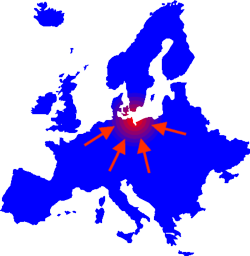Star March Coalition: Courts Grant Appeal- Star March Can Happen

Star March Coalition
Press Release
May 25th 2007
G8 2007 Protests in Germany
- Courts Grant Appeal: Star March Can Happen
- The Star March Intends to go all the Way to the Kempinski Hotel
- ‘State of Emergency’ Does Not Justify a General Ban
The urgent appeal of the Star March Coalition lodged at the Schwerin Court has been successful. The Coalition had lodged a law suit against the general demonstration ban issued by the police department. A general injunction over a 40 square kilometer area had been designated as a demonstration free zone. Such an injunction would have been unprecedented in the history of Germany.
The Schwerin Court has only granted a partial lift of the injunction. The Star March Coalition had registered their final rally at the Kempinski Hotel. With this, the protest was to be taken to the addressees: The meeting of the Heads of State of the G8. The Court has decided that demonstrations are allowed to take place on 4 of 6 of the planned routes and at a distance of 200 m from the fence.
The Court has explained that the “suspected threats to public security can be sufficiently contained with less extreme measures than a general ban.” Of course we are happy that our right to demonstrate has been confirmed in the first instance. A huge thank-you to the lawyers”, Susanne Spemberg and Peter Kromrey of the Star March Coalition explain. There had been a broad wave of international criticism in response to the injunction. “However, we will continue to question the ban on demonstrations within the area sealed off by the fence. We will decide in the next few days whether to appeal against the decision.”
At the beginning of the week the groups affected by the total prohibition of all assemblies at the military airport Rostock Laage had also lodged an appeal. In the next days, the organization ‘Jewish Voice’, who had registered a rally at the fence on June 5th, will also lodge an appeal. “We expect that with the decision to allow the Star March to happen, all other bans will be lifted too”, Matthias Monroy of the Gipfelsoli Infogruppe states. All organizers have to make individual cases against the ban.
The Star March Coalition is represented by the Hamburg-based lawyers Carsten Gericke, Ulrike Donat and Cornelia Ganten-Lange. “We were all convinced from the beginning that a complete ban could never be upheld”, Carsten Gericke comments.
The lawyers critcise that the police have been planning this injunction for months: “Other de-escalating and staggered concepts were at no point taken into consideration”, it states in the appeal.
The police had argued that the ban was necessary because of a ‘state of emergency’.
A line of argument that invokes a ‘state of emergency’ denies citizens their basic rights. The assumption that all large political events demand the declaration of a ‘state of emergency’ would be a poor showing for the German constitutional State, that could in future regularly curtail civil liberties via such injunctions, without sufficient reason to do. Injunctions have never stopped assemblies but have only contributed to escalation, because not enough space was left for people to articulate their protest legally.
Carlo Paul of the Star March Coalition states,“With the Star March we want to make our ideas for another possible world visible. Social revolutionaries, globalization critics, peasants, trade unions, the environmental movement and radical feminists: on June 7th we will all raise our voices against the pernicious politics of the G8.”
[Star March Coalition]
Images:

/




